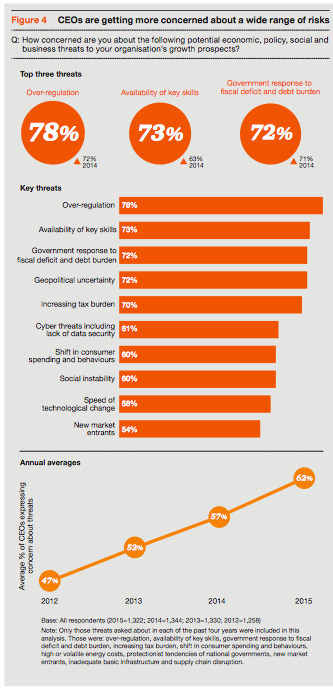-
One of the biggest challenges for CEOs is making sure they have the right people to cope with the future – a near impossible feat for the rapidly changing digital age. Across the Asia Pacific, the speed of change is reshaping the way we live and work and business strategies are undergoing a fundamental re-think.
"Businesses are increasingly turning to contingent workers, part-time employees, outsourcing and service agreements to fill their talent gaps."
Bruce Hassall, Chief Executive Officer of PwC New Zealand
PwC's most recent Global CEO Survey has shown it's a key concern for leaders in our region. In Australia, 74 per cent of CEOs in Australia say the availability of key skills is a threat, putting it on par with the global average of 73 per cent.
It's higher in New Zealand, where skills availability it is the top concern among CEOs (84 per cent), ranking higher than cyber security or over-regulation as a threat to business growth.
CEOs in Japan are the most concerned in the Asia Pacific about skills. Over nine in 10 of those surveyed say the availability of key skills is a threat to their organisation's growth prospects. Japan was closely followed by China (90 per cent) and Hong Kong (85 per cent).
With CEOs globally more concerned about the impact of a skills shortage on their business than at any point in the last six years, organisations' people strategies must adjust and transform rapidly.
Businesses are increasingly finding it difficult to secure people with the skills they need to grow. Three quarters of the 1,300 CEOs interviewed for the survey rank skills shortages as the biggest threat to their business growth. This represents a 10 percentage point jump from 2014 and is up from less than half (46 per cent) six years ago.
COMPLEX AND SHIFTING
Despite rising business confidence and ambitious hiring plans, organisations are facing a complex and shifting world where technology is driving huge changes.
More than half of CEOs in New Zealand (52 per cent) and Australia (55 per cent) say they plan to increase their headcount this year, yet the struggle for them has never been greater to find the right people with the right skills to achieve their growth plans.
What skills are needed now and in the future? This question has transformed from just a nagging worry for CEOs into something far more challenging.
The questions don't end there. Which roles will be automated? What new roles will be needed to manage and run emerging technology? What skills should the company be looking for, and training their people for? Where will we find the people we need?
Those with strong technology skills who can adapt and work across different industries are desperately needed but they're difficult to find and can afford to charge a premium for their skills.
FILLING THE GAPS
Businesses are increasingly turning to contingent workers, part-time employees, outsourcing and service agreements to fill their talent gaps.
{CF_IMAGE}
Nearly 40 per cent of New Zealand CEOs say they have greatly increased their reliance on contractors, part-time workers, outsourced functions or service agreements recently, compared with 31 per cent in Australia.
As businesses are also looking for a wider mix of skills than in the past, searching for talent in different geographies, industries or demographic segments will be explored.
A whopping 90 per cent of CEOs in Australia say they are searching for a broader range of skill sets than in the past, compared with 73 per cent in New Zealand and 81 per cent globally.
Filling talent gaps is also a major driver of merger and acquisition activity, with over a quarter of CEOs saying access to top talent is the main reason for collaborating with other organisations.
This is creating a 'gig economy', where workers with the most in-demand skills can dictate where and when they work, and who they work for.
Leaders need to ensure their organisations are fit to react quickly to whatever the future holds – and that means filling it with adaptable, creative people and working in a culture where energy and ideas spark into life. If they can't be found, they must be created.
Real competitive advantage will not come from the best technology but in using and managing your talent well. It's people who will make the difference between eventual success and failure.
Bruce Hassall is New Zealand's Chief Executive Officer at PwC.
The views and opinions expressed in this communication are those of the author and may not necessarily state or reflect those of ANZ.
-
anzcomau:Bluenotes/business-finance,anzcomau:Bluenotes/business-finance/research,anzcomau:Bluenotes/business-finance/talent
A people strategy for the digital age
2015-06-15
EDITOR'S PICKS
-
New Zealand's “rock star" economy may be peaking but its chief executives remain more optimistic than Australian – and global – peers.
12 March 2015

